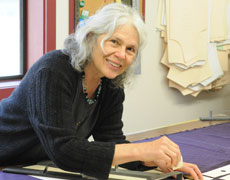Sustainability: It's Complicated…and Simple
Posted by Rose on 13th May 2016
Where sustainable clothing is concerned, shopping local can help.
Sympatico’s Trapeze Tunic is made using sustainable hemp and Tencel.
Getting to a genuine definition of just what is sustainable clothing, or any other product, presents an ongoing challenge. It's well and fine to resort to the formula that says sustainability is meeting human needs within the constraints of supporting natural systems. But who gets to decide what are human needs versus human wants? And who makes the call on what natural systems are capable of sustaining? Mahatma Gandhi brought the issue into sharp ethical focus by pointing out, "The world has enough for everyone’s need, but not enough for everyone’s greed".
It's reasonable to say that every human should have access to potable water, nourishing food, adequate clothing and shelter, and opportunities for work that's safe and fairly paid. But each of these human needs is subject to interpretation based on economic and political contexts.
As I key in these thoughts on a Mac, I'm reminded of a recent, well-balanced story addressing the ethical complexities surrounding Apple's China-based manufacturing. As the article clearly illustrates, making choices as consumers far removed from the places where most of the high-tech products we use are manufactured is nuanced and challenging.
Thankfully, unlike with electronics that are almost entirely made overseas, making informed choices when it comes to buying our basics such as food, clothing, and shelter can be a more certain process. Opting for locally produced food and apparel are two examples. I like what Susan Witt of the E.F. Schumacher Society has to say in arguing for regional economies and currencies:
"By intentionally narrowing our choices of consumer goods to those locally made allows us to know more fully the story of the items purchased; stories that include the human beings that made them and the rivers, minerals, and animals that gave of their substance to form them. Such stories, formed from real life experience, work in the imagination to foster responsible consumer choices and re-establish a commitment to the community. In this sense, local currencies become a tool not only for economic development, but for cultural renewal."
We're encouraged by the phenomenon of burgeoning farmers markets and support for artisanal work. They express a renewed appreciation for work and products that are good for humans and the earth. As much as we applaud the mainstream fashion industry's recent attempts to curb the worst aspects of fast fashion, true transparency for consumers is extremely challenging to achieve in a global economic system in which it's hard to know the true story behind the things we buy. By being conscious shoppers who opt for quality over lowest price, and being willing to take the time to learn the stories of the things we consume, we can begin to move towards genuine sustainability.
Of course, even artisanal enterprises such as Sympatico find themselves caught up in global markets. Seeking out raw and finished materials with which to ply your trade often means accessing those materials continents away. That can make confirming the sustainability of those goods difficult, especially for smaller businesses without the economic clout to push for transparency.
Share:






